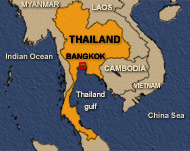Insurgency troubles Thai government
Thai officials have held an emergency security meeting after a bomb injured 28 people in a tourist district in the mainly Muslim south.

The government vowed on Sunday to retaliate with stiffened measures to curb the unrest that has left 55 people dead since January, mainly government officials and security forces.
In a statement, officials condemned the perpetrators of Saturday night’s blast.
“Those who carried out the blast last night aimed to cause casualties among innocent people,” said government spokesman Jakrapob Penkair. “The incident shows they have … changed their strategies.”
Jakrapob said there was no evidence that foreign terrorist groups were behind the bombing but that it was possible the perpetrators were trained outside Thailand.
“We have no evidence that international groups planned the bomb or sent someone to do it,”
“It remains an insurgency in the country. It remains a disturbance that the Thai government has to try to handle and resolve,” he said.
|
“These people want to discredit the government. They want to cause political instability and damage investment and tourism sentiment” Deputy Prime Minister Wan Muhamad Noor Matha |
Teachers, civil servants, police and army officers and even Buddhist monks have been targeted in dozens of brutal hit-and-run strikes aimed at challenging the rule of the central government in Bangkok.
Increased security
But the blast in Sungai Kolok, a town on the Malaysian border that is packed with nightspots, karaoke bars and brothels, is the first time civilian or tourist districts have been targeted.
Police said security had been stepped up around Sungai Kolok, with extra road blocks and patrols across the ramshackle town in Narathiwat province, while a team of investigators began probing the attack.
Bangkok has blamed a mixture of separatists and gangsters in a region also notorious for smuggling arms and drugs.
“These people want to discredit the government. They want to cause political instability and damage investment and tourism sentiment,” Deputy Prime Minister Wan Muhamad Noor
Matha told reporters after visiting victims in hospital.
Underlining the seriousness of the development, Prime Minister Thaksin Shinawatra postponed a trip to Europe due to begin on Sunday and instead held crisis talks with the army chief and ministers for defence and security.
Jakrapob said they resolved to analyse separatist and “terrorist” networks operating in Thailand and determine their links with other illicit activities like the narcotics trade which flourishes on the Thai-Myanmar border.
Motorcycle bomb
Police said the bomb was placed on a motorcycle near a bustling strip of bars, and that most of those injured were women working in the nightspots and their customers.
 |
|
The blast occurred in the south |
Medical officials said that of the 28 wounded who needed hospital treatment, three were Malaysians. Two people, including one of the Malaysians, were seriously injured and were in an intensive care unit.
Narathiwat governor Wichom Thongsong said the attack was carried out in retaliation over efforts to rein in the violence, including last week’s arrest of nine people linked with a deadly 4 January raid on an army base.
“The bomb was a response to authorities who are working to re-establish order in the south,” he said, adding that as yet no one had claimed responsibility for the blast.
One of the nine arrested over the raid is a prominent member of Thaksin’s ruling party who faces treason charges for his alleged role in the attack which left four soldiers dead and heralded this year’s unrest.
The government has struggled to contain the violence and earlier this month Thaksin sacked his ministers for defence and the interior for failing to curb the separatist activity.
Far from abating, the violence appears to have significantly escalated in recent days. A bomb exploded last Tuesday near a city hall in Narathiwat where new interior minister Bhokin Balakula was meeting with local officials.
Thailand is a predominantly Buddhist nation but about five percent of the population is Muslim, and most live in the five southern provinces bordering Malaysia.
The region was plagued by separatist violence until the 1980s when the government managed to curb rebel activity, but in the last few years violence has flared again.